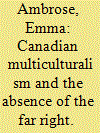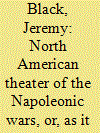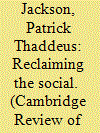| Srl | Item |
| 1 |
ID:
139809


|
|
|
|
|
| Summary/Abstract |
The far right has never been a prominent force in Canadian politics or society. Traditionally, they more resembled the North American than the West European model: ideologically dominated by right-wing populism and white supremacy, organizationally characterized by factionalism and sectarianism. The extreme right seems an almost negligible force today, in part reflecting a similar decline in the United States, while the radical right has so far been unable to build upon the recent upsurge of Islamophobia, as in Western Europe. We argue that the failure of the Canadian radical right is primarily the result of Canada's unique multiculturalism policy, which is based on a combination of selective immigration, comprehensive integration, and strong state repression of dissent on these policies. This unique blend of policies has led to a relatively low level of opposition to multiculturalism and has left little legal and political space for far right politics.
|
|
|
|
|
|
|
|
|
|
|
|
|
|
|
|
| 2 |
ID:
117172


|
|
|
| 3 |
ID:
168763


|
|
|
|
|
| Summary/Abstract |
Even in the North American and European context, relationalism comes in many flavours. We identify the common features of relational approaches, including varieties of practice theory, pragmatism and network analysis. We also identify key disagreements within relationalism, such as the relative explanatory importance of positional and process-oriented analysis. Our discussion reveals the problems that come from associating relationalism solely with other clusters of international-relations theory, such as constructivism. It also allows us to construct a typology of major relational frameworks in the field, and provides a better foundation for comparing and contrasting Chinese and Western relationalisms.
|
|
|
|
|
|
|
|
|
|
|
|
|
|
|
|